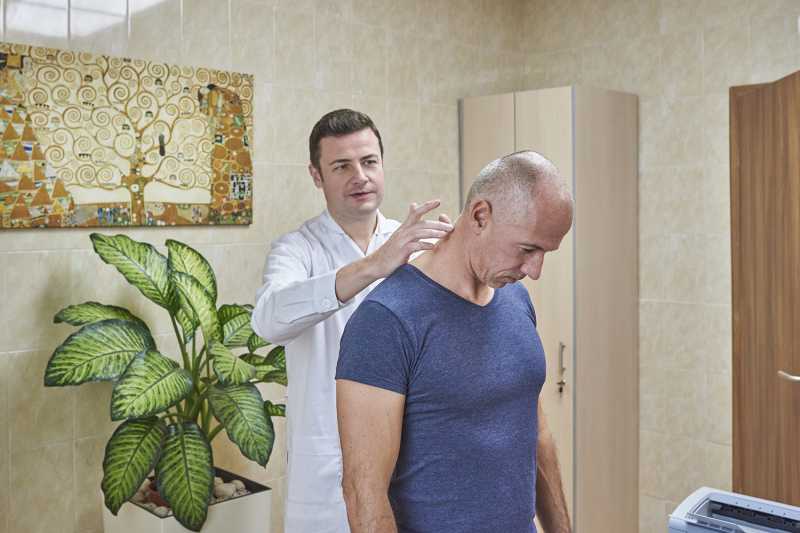Musculoskeletal diseases in Hungary are considered endemic, as they affect more than 20% of the population. There is hardly a man who would not experienced pain in his back, lower back, shoulders, knees, ankles or in joints of the hand at least once in his life.
- Chronic degenerative joint diseases cause symptoms in nearly half of people over 40 (hip and knee arthritis, arthritis of the small joints of hand, tendonitis, tennis elbow, golf elbow, bursitis, muscle pain in the area of neck, back, shoulders and waist, spinal arthritis conditions, e.g. calcific depositions, scoliosis, intervertebral disc diseases; muscle or connective tissue derived conditions, and autoimmune disorders).
- Development of osteoporosis is becoming earlier and earlier, it might occur in the mid-thirties both in men and women.
- Many forms of inflammatory rheumatological diseases spoil the quality of life (e.g. rheumatoid arthritis, systemic autoimmune diseases, spondylarthropathies, other arthritic conditions. There are also forms that were diagnosed in even early childhood.
- Minor but not negligible layer is affected by soft tissue rheumatism and metabolic bone diseases.
- Acute pain syndrome (low back pain, osteoporotic hip, vertebral, forearm fractures, acute arthritis) restricts the daily lifestyle of many patients.
Sedentary lifestyle, sitting work, obesity, unhealthy diet, smoking, excessive alcohol intake play role in development of diseases and complaints. The disease usually develops over a longer period, however the age and hereditary family factors may also contribute the appearance of the symptoms. Sequelae is very common following joint injuries, musculoskeletal surgeries.
A minor part of the diseases causes only temporary disability, pain but unfortunately the most developed musculoskeletal disorder is final and not reversible. However, further deterioration can be stopped, complaints can be relieved. This is why early detection, treatment, and correction of difference of movement functions is important in order to preserve the health of the joints, bones, skeleton as long as possible.
During rheumatology examination our specialist takes the medical history of the patient, discusses the current complaints with the patient, performs a physical examination, including the check of the joint range of motion, muscle strength, reflexes, and pain as well. In most cases in order to establish an accurate diagnosis and therapy recommendations, further examinations are required (e.g. laboratory tests, X-ray, bone density examination, joint ultrasound, thermography). All of the mentioned examinations are provided in our Institute on-site.
In addition to or in parallel with the classical medicinal therapy a number of alternative methods is available for the specialist in order to be able to relieve the complaints of the patients visiting him, according to the current state of the medical science.
- Chronic degenerative joint diseases cause symptoms in nearly half of people over 40 (hip and knee arthritis, arthritis of the small joints of hand, tendonitis, tennis elbow, golf elbow, bursitis, muscle pain in the area of neck, back, shoulders and waist, spinal arthritis conditions, e.g. calcific depositions, scoliosis, intervertebral disc diseases; muscle or connective tissue derived conditions, and autoimmune disorders).
- Development of osteoporosis is becoming earlier and earlier, it might occur in the mid-thirties both in men and women.
- Many forms of inflammatory rheumatological diseases spoil the quality of life (e.g. rheumatoid arthritis, systemic autoimmune diseases, spondylarthropathies, other arthritic conditions. There are also forms that were diagnosed in even early childhood.
- Minor but not negligible layer is affected by soft tissue rheumatism and metabolic bone diseases.
- Acute pain syndrome (low back pain, osteoporotic hip, vertebral, forearm fractures, acute arthritis) restricts the daily lifestyle of many patients.
Sedentary lifestyle, sitting work, obesity, unhealthy diet, smoking, excessive alcohol intake play role in development of diseases and complaints. The disease usually develops over a longer period, however the age and hereditary family factors may also contribute the appearance of the symptoms. Sequelae is very common following joint injuries, musculoskeletal surgeries.
A minor part of the diseases causes only temporary disability, pain but unfortunately the most developed musculoskeletal disorder is final and not reversible. However, further deterioration can be stopped, complaints can be relieved. This is why early detection, treatment, and correction of difference of movement functions is important in order to preserve the health of the joints, bones, skeleton as long as possible.
During rheumatology examination our specialist takes the medical history of the patient, discusses the current complaints with the patient, performs a physical examination, including the check of the joint range of motion, muscle strength, reflexes, and pain as well. In most cases in order to establish an accurate diagnosis and therapy recommendations, further examinations are required (e.g. laboratory tests, X-ray, bone density examination, joint ultrasound, thermography). All of the mentioned examinations are provided in our Institute on-site.
In addition to or in parallel with the classical medicinal therapy a number of alternative methods is available for the specialist in order to be able to relieve the complaints of the patients visiting him, according to the current state of the medical science.


